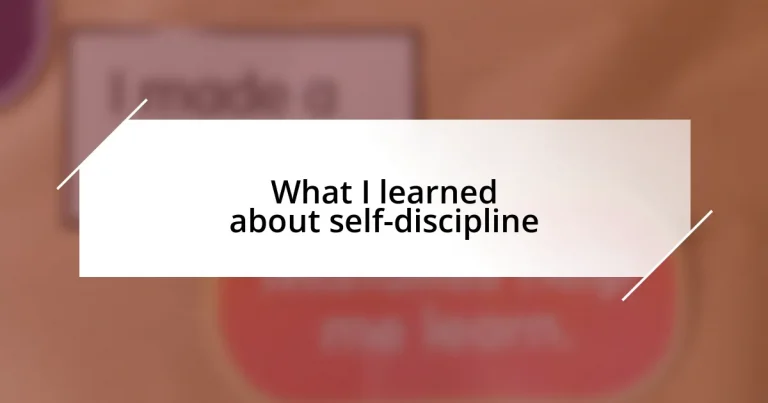Key takeaways:
- Self-discipline is crucial for achieving goals and fostering better life choices aligned with long-term aspirations.
- Clearly identifying personal goals provides direction and focus, making it easier to maintain commitments.
- Implementing effective time management techniques, such as the Pomodoro technique and the Eisenhower Matrix, enhances productivity and adaptability.
- Regularly tracking progress and rewarding accomplishments meaningfully strengthens motivation and reinforces self-discipline.
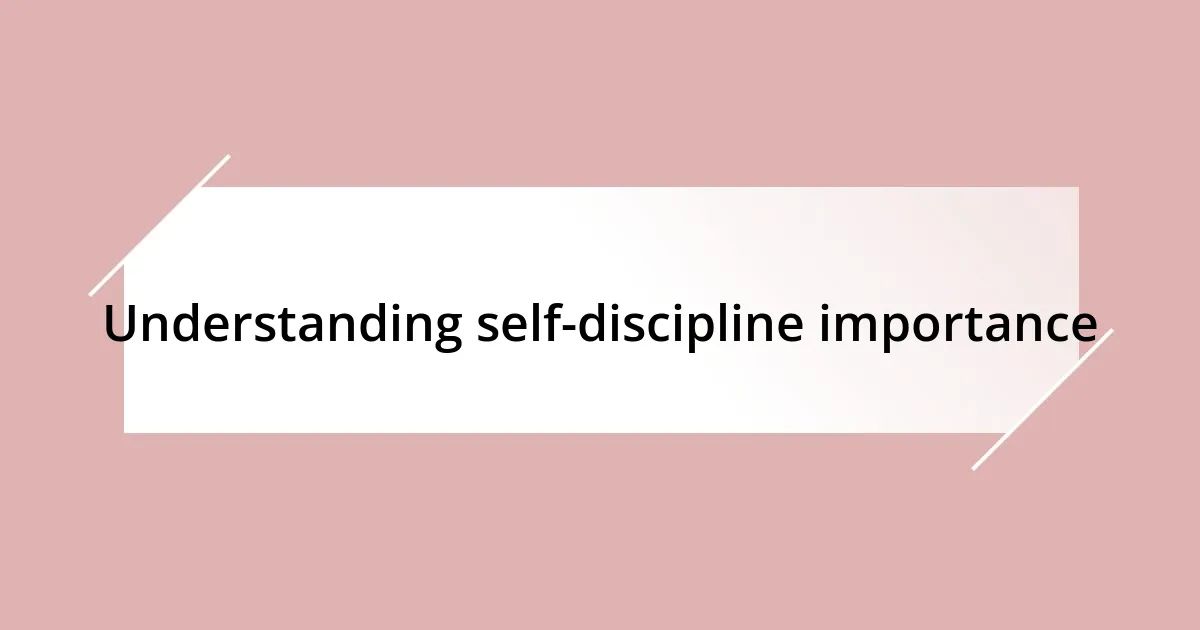
Understanding self-discipline importance
Self-discipline is the backbone of achieving our goals. I remember a time when I wanted to run a marathon. It wasn’t just about the training; it was about saying no to distractions and yes to early mornings. How many times have you struggled with a commitment that felt bigger than you? That’s where self-discipline steps in, giving us the strength to push through.
Sometimes, self-discipline feels like a silent partner guiding our decisions. There were moments when I faced temptations—eating junk food instead of healthy meals or skipping workouts. In those instances, I learned that discipline isn’t about strict rules; it’s about making choices aligned with our long-term aspirations. Can you recall a time when a simple, disciplined choice led to a breakthrough in your journey?
Understanding the importance of self-discipline can transform our perspectives. It’s not just about restriction; it’s about freedom—the freedom to pursue our passions without being held back by fleeting desires. I often reflect on how embracing self-discipline has allowed me to build better habits, leading to a more fulfilling life. The power of commitment shouldn’t be underestimated; it can change our entire outlook on what we can achieve.
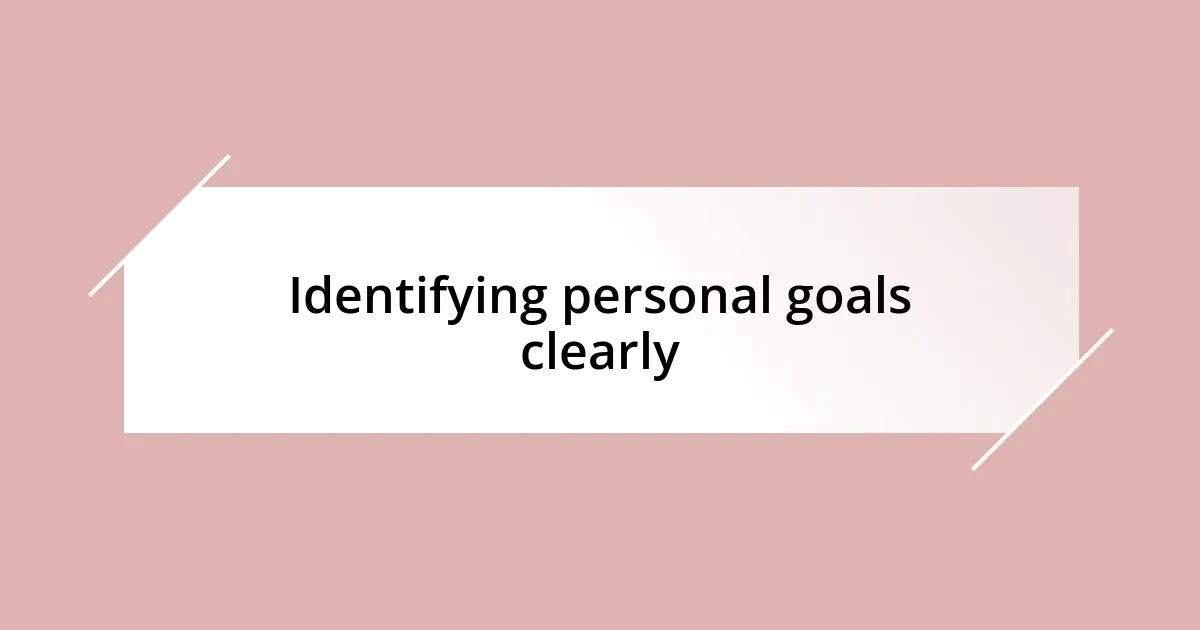
Identifying personal goals clearly
Identifying personal goals clearly sets the foundation for self-discipline. I recall sitting down one evening with a journal and a cup of tea, trying to map out what truly mattered to me. It was a mix of excitement and fear, knowing that clarity would lead me to the next steps in my journey. Without clear goals, I found myself scattered, like leaves blown by the wind. How do you choose the path when there’s no direction?
When I finally articulated my goals, it felt like lifting a fog. I broke them down into smaller, actionable steps and wrote them down. For instance, instead of just saying, “I want to be fit,” I specified, “I will exercise three times a week.” This shift changed everything! Suddenly, it became easier to maintain my commitment. Have you ever experienced that “aha” moment when clarity unlocked a previously closed door?
Being clear about your personal goals helps in staying focused. I remember during a particularly challenging week, when motivation waned; having specific goals reminded me why I started in the first place. Taking a moment to revisit my goals reignited my passion and kept distractions at bay. In this way, identifying personal goals doesn’t just fuel discipline; it nourishes your drive and commitment.
| Goal Type | Description |
|---|---|
| Short-term Goals | Specific, actionable tasks aimed at immediate outcomes. |
| Long-term Goals | Broader objectives that require sustained effort over time. |
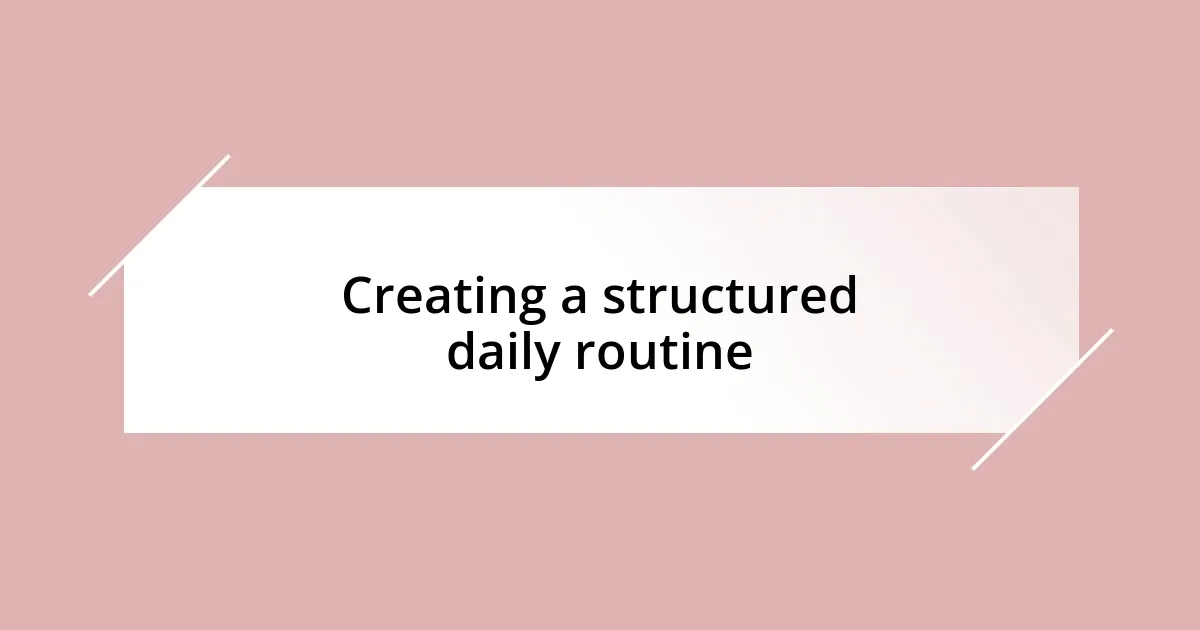
Creating a structured daily routine
Creating a structured daily routine has been a game-changer for my self-discipline. I used to wake up without a plan, and my days would slip by in a blur of distractions. Once I decided to establish a routine, I felt a sense of control that had been missing before. Gradually, I learned that setting specific times for tasks, like exercising or even enjoying a cup of coffee while reflecting on my goals, anchored my day in purpose.
Here are a few essential elements I’ve found helpful in creating a structured routine:
- Morning Rituals: I always start my day with a consistent morning routine to set the tone.
- Task Blocks: I allocate specific time blocks for different activities, helping me maintain focus.
- Breaks: I include short breaks between tasks to recharge, preventing burnout.
- Evening Reviews: I spend a few minutes reflecting on what I accomplished and what I can improve.
By embracing this schedule, I found clarity in my day-to-day activities. In a previous stint at work, I noticed that those who thrived had well-planned schedules; it inspired me to adopt similar habits. I began to appreciate how even a simple structure could support my long-term goals, making my journey toward self-discipline feel less overwhelming.
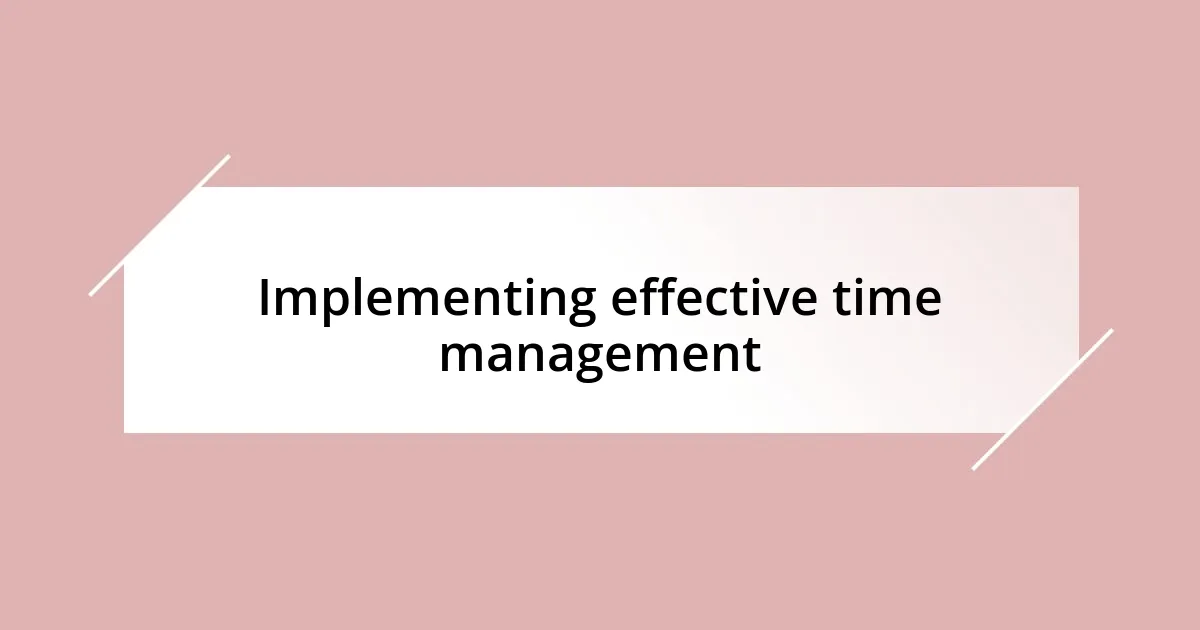
Implementing effective time management
Implementing effective time management is something I’ve come to value deeply in my journey of practicing self-discipline. I recall a time when my to-do list seemed unending, and I constantly felt like I was chasing my tail. I decided to adopt the Pomodoro technique, working in 25-minute focused bursts followed by a 5-minute break. This simple change transformed my productivity. Have you ever felt the rush of accomplishing one task at a time instead of trying to multitask everything, only to finish nothing?
Another critical aspect of effective time management is prioritization. I remember feeling overwhelmed by the sheer volume of tasks on my plate, from work commitments to personal goals. I started using the Eisenhower Matrix—dividing tasks into four categories based on urgency and importance. This visual approach made it clear what should be tackled first and what could wait. It was liberating to learn that not every task deserves my immediate attention; it’s taught me to focus on what truly moves the needle in my life.
Lastly, I’ve learned that time management isn’t just about the tasks themselves; it’s also about flexibility. One day, I had meticulously planned my schedule, only to face unexpected interruptions. Instead of letting frustration take hold, I adjusted and reprioritized. I realized that self-discipline isn’t about sticking rigidly to a plan but about adapting while still moving forward. Have you ever had to pivot mid-day? It can be a breath of fresh air when you embrace the unexpected and roll with it!
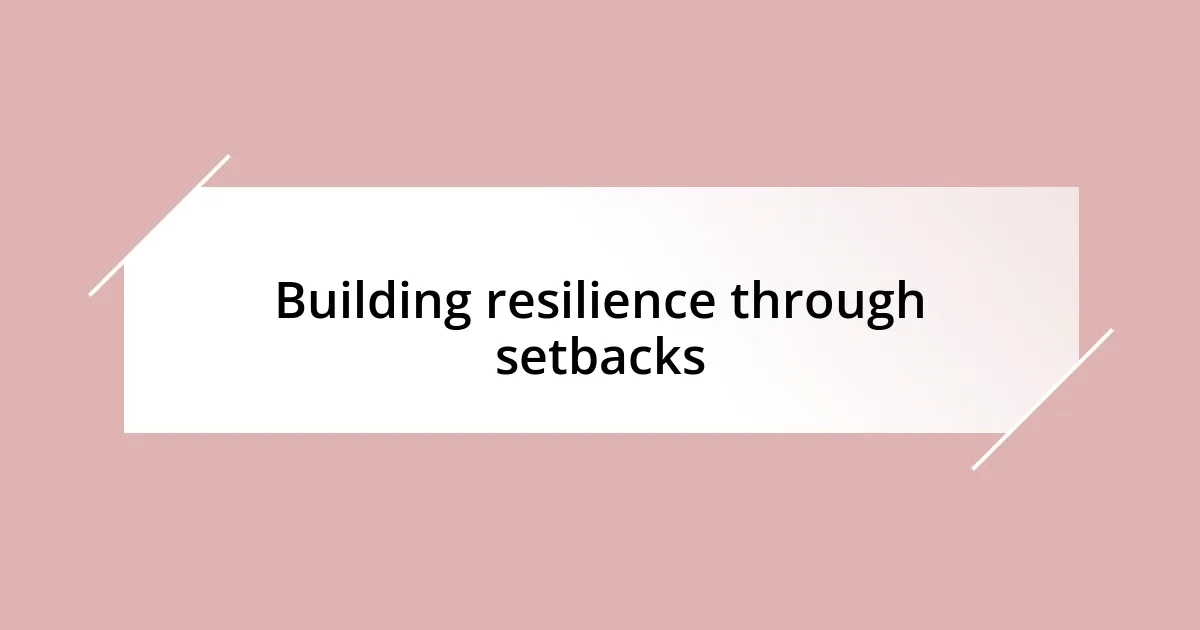
Building resilience through setbacks
Building resilience through setbacks is a powerful lesson I’ve learned on my journey. I remember a particularly challenging moment early in my career when I faced a significant rejection. My initial reaction was to feel defeated and question my abilities, but over time, I realized that this setback was a crucial turning point. Instead of seeing it as the end, I began to view it as an opportunity to grow and refine my approach. Have you ever experienced a similar moment? It can be surprising how much strength lies just beneath our surface, waiting to be tapped into when faced with adversity.
Embracing setbacks has taught me that resilience isn’t about avoiding failure; it’s about confronting it head-on. After that rejection, I sought feedback and worked tirelessly to improve my skills. I vividly recall the late nights spent preparing for the next opportunity, fueled by a mix of determination and self-reflection. Each small step forward felt like a victory, reinforcing my belief that resilience grows stronger with each challenge we face. The journey isn’t always easy, but I’ve learned that resilience is built not in moments of triumph but in how we respond to our deepest disappointments.
Ultimately, the most profound transformations often occur in times of struggle. When I look back at the hurdles I’ve encountered, I see them as vital lessons rather than obstacles. For instance, after a project that didn’t go as planned, I sought out a mentor who reshaped my perspective and offered invaluable encouragement. In those moments, I realized that asking for help is a sign of strength, not weakness. Have you ever found unexpected support during difficult times? It’s incredible how resilience can be nurtured through our connections with others, further reinforcing the idea that each setback is a step toward greater strength and understanding.
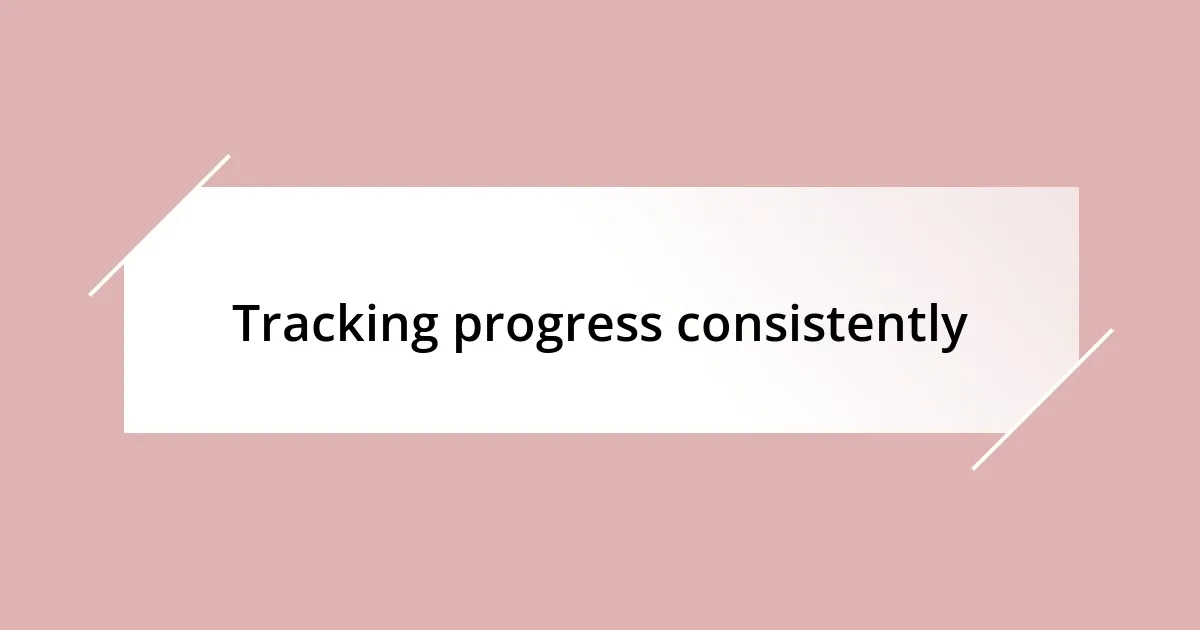
Tracking progress consistently
Tracking progress consistently has been a game-changer in my self-discipline journey. There was a time when I would set goals but felt lost without knowing how I was doing. That’s when I decided to keep a journal, writing down daily accomplishments, no matter how small. Have you ever experienced that exhilarating moment when you see your progress laid out on paper? It’s like a light bulb going off, reminding me that every step counts toward my bigger goals.
In my experience, tracking progress isn’t merely about seeing numbers or completing checklists; it’s about reflecting on my growth. I remember when I embarked on a fitness journey. At first, I just focused on the scale, but soon I realized that tracking my time and endurance was equally important. The feeling of running an extra mile or lifting heavier weights was immensely rewarding. It made me realize how vital it is to celebrate those wins rather than just fixate on the end result. How do you measure your triumphs in everyday life?
Moreover, I’ve discovered that consistency in tracking serves as a motivational tool. Whenever I felt like giving up, I’d look back at my notes and remind myself of the progress I’d made, which reignited that fire within me. I remember days when I would feel defeated, questioning if my efforts were worth it. But flipping through my journal, seeing months of dedication reflected back at me, was like a gentle nudge saying, “You can do this.” It’s fascinating to consider how tangible evidence of progress can empower you to keep pushing forward, isn’t it?
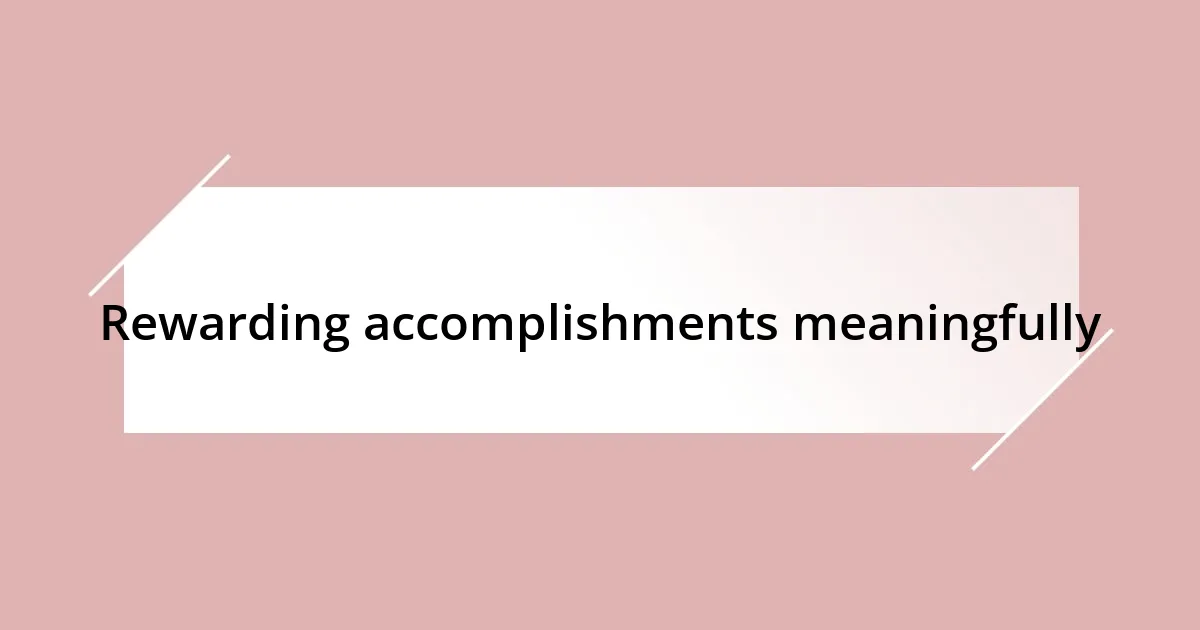
Rewarding accomplishments meaningfully
Rewarding accomplishments meaningfully can be a subtle yet powerful part of fostering self-discipline. I remember the time I finished a challenging project ahead of schedule; instead of simply moving on to the next task, I decided to treat myself to a nice dinner at my favorite restaurant. It wasn’t just about the meal; it was a way to acknowledge the hard work I’d put in. Have you ever celebrated a small win in an unexpectedly meaningful way? Those moments can really boost your motivation and remind you why you strive to succeed.
Creating a personal reward system has been incredibly impactful for me. I’ve found that setting aside time for activities I enjoy, like reading a new book or binge-watching a beloved series, turns those accomplishments into milestones. After achieving a long-term goal, I remember treating myself to a weekend getaway, which felt like a well-deserved break from routine. It’s amazing to see how these rewards function as little celebrations that keep my spirits high. How do you recognize your achievements in everyday life?
Moreover, I’ve learned that the smaller the accomplishment, the more meaningful the reward should be. After completing a challenging week of work, I would indulge in a relaxing spa day at home—soft music, candles, and a warm bath. It was more than just pampering; it was an acknowledgment of my efforts that made me feel valued. This practice not only reinforces my self-discipline but also makes the journey enjoyable. Isn’t it wonderful how taking a moment to appreciate our hard work elevates our overall experience?












